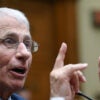Iranian political dissidents are notorious for their bitter factions and for not being able to work together—probably the single biggest cultural asset the Islamic Republic regime has. However, the Iran Democratic Transition Conference showed Iranians finding unity on a common purpose, bringing democracy to their home country where the longing for it runs deep.
Taking place over the weekend at George Washington University and sponsored by the Institute for World Politics, the conference concluded on Capitol Hill Monday with the announcement of the creation of the Iran Freedom Caucus in the House of Representatives, co-sponsored by Representatives Trent Franks (R–AZ) and Ted Deutch (D–FL). The purpose of the conference was education, debate, and networking, and there was plenty of all three going on.
The gathering was organized by leaders of the student movement in Iran who are exiled in the U.S., Canada, Europe, and Malaysia. For perhaps the first time, it brought together bitter opponents of the regime and of one another who finally sat down together in a public setting and agreed to bury the hatchet and work together. This included people who had refused to even speak to one another for as long as 40 years.
The conference also provided a physical network among young Iranian activists who had previously been connected only by Facebook, e-mail, and Skype. They came from Germany, Sweden, the Netherlands, Canada, the U.K., and other countries already knowing one another from their online communications, so they already had the camaraderie built in; it was like a reunion that energized all of them. Iranians still inside Iran participated in the conference via Skype.
The conference also bridged a huge generation gap among Iranians. With about 75 percent of the Iranian population younger than 35 and most of the established expatriate “leaders” in their 60s or older, there has been a significant disconnect between Iran’s youthful population and the expatriate leaders who claim to represent Iranian democrats back home. The conference literally introduced them to one another. For years they talked past one another and even badly about one another. At the conference we saw something new: what for many was a meaningful, first-ever direct communication and dialogue between the established elder expats and the newly arrived younger Iranians. One of the elder expats, who runs a U.S.-based Persian-language TV station, sat down with about 10 of the younger people for a videotaped roundtable discussion. Then he sat up all night with them and ate pizza.
Additionally, the conference brought together politically active Iranians who actually believe that a democratic revolution is possible in their country. To a person, even though they have different political views, they believe that reform is not possible; only a popular democratic revolution (the kind that swept away communism in Europe) is the solution for Iran. They firmly believe that it is possible and that all the pieces are in place.
Political prisoner Arjang Davoodi sent a message of strong support for the conference and for its coordinator, Confederation of Iranian Students Chairman Amir Abbas Fakhravar. He made an audio statement for the conference that the confederation smuggled out of the Rajee-Shahr prison.
Unfortunately, the obstacle to a democratic revolution is in large part the continued lack of multilateral international oil sanctions against the regime, which ensures the regime’s survival, giving it the lifeblood it needs. A conspicuous lack of significant U.S. support for democracy in Iran is a sore point with political activists, as are the shortcomings of Voice of America’s (VOA) Persian service. Senator Jeff Sessions in his remarks Monday commented on the attempts to fix VOA Persian-language broadcasting and asked the Iranian activists if VOA was helpful or still needed fixing. He received a resounding response that VOA still has a long way to go.
It is telling that the U.S. State Department was invited to send observers and chose not to. In fact, the State Department dragged its feet on issuing visas to some of the international participants, denying visas to several and delaying visas to others, which made their participation impossible. Among those denied a visa was Caspian Makan, the fiancé of Neda Agha-Soltan, the girl who was murdered in the streets during the June 2009 protests. Caspian is living in Canada, where he received political asylum, but State did not make it possible for him to attend the conference. There was a powerful symbolism in the fact that the conference took place on Neda’s birthday, January 23.
The conference also had the participation of one of the leaders of the “Green Diplomats,” a movement of Iranian diplomats who have quit working for the Islamic Republic and have defected to the West. Three diplomats who defected in Finland, Norway, and Japan were invited, but the State Department would issue a visa to only one of them, Abolfazl Eslami, a former minister counselor at the Iranian Embassy in Tokyo.
In addition to the Iranian speakers, the conference included Serbian student activist Ivan Marovic, who was part of the movement to bring down Slobodan Milosevic. Marovic gave a superb nuts-and-bolts presentation about organizing people power against a dictatorial regime.
Official participants in the conference included representatives of the National Democratic Institute and the International Republican Institute.
The Iran Democracy Transition Conference provided gave hope that political forces beyond the Tehran regime’s control are getting ready for the day when it will crack from internal and external pressure. When that day comes, the political opposition has to be ready to lead.






























